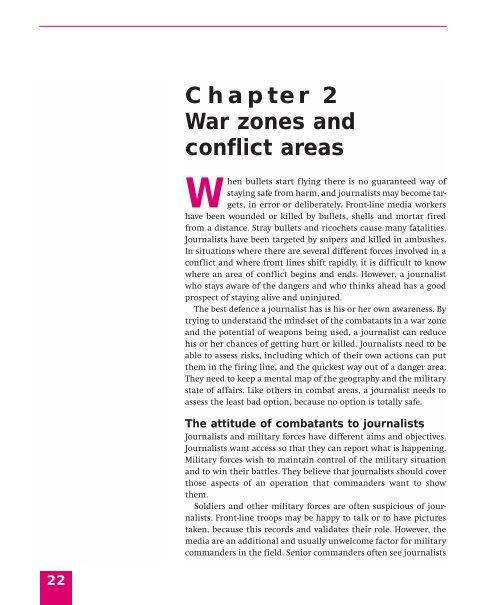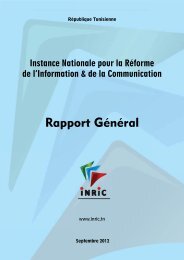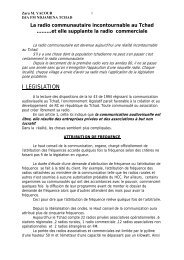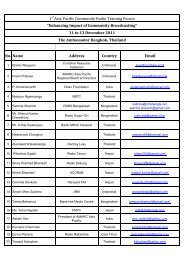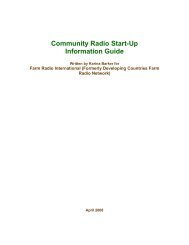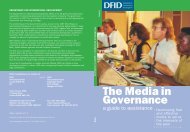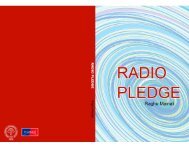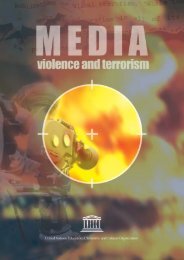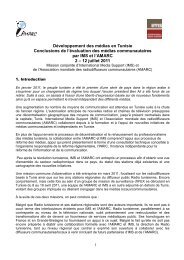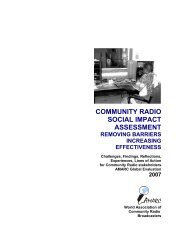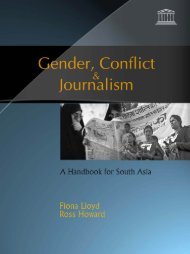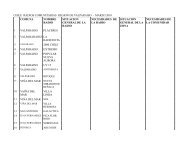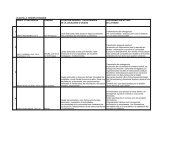Chapter 2War zones andconflict areasWhen bullets start flying there is no guaranteed way <strong>of</strong>staying safe from harm, and journalists may become targets,in error or deliberately. Front-line media workershave been wounded or killed by bullets, shells and mortar firedfrom a distance. Stray bullets and ricochets cause many fatalities.<strong>Journalists</strong> have been targeted by snipers and killed in ambushes.In situations where there are several different forces involved in aconflict and where front lines shift rapidly, it is difficult to knowwhere an area <strong>of</strong> conflict begins and ends. However, a journalistwho stays aware <strong>of</strong> the dangers and who thinks ahead has a goodprospect <strong>of</strong> staying alive and uninjured.The best defence a journalist has is his or her own awareness. Bytrying to understand the mind-set <strong>of</strong> the combatants in a war zoneand the potential <strong>of</strong> weapons being used, a journalist can reducehis or her chances <strong>of</strong> getting hurt or killed. <strong>Journalists</strong> need to beable to assess risks, including which <strong>of</strong> their own actions can putthem in the firing line, and the quickest way out <strong>of</strong> a danger area.They need to keep a mental map <strong>of</strong> the geography and the militarystate <strong>of</strong> affairs. Like others in combat areas, a journalist needs toassess the least bad option, because no option is totally safe.The attitude <strong>of</strong> combatants to journalists<strong>Journalists</strong> and military forces have different aims and objectives.<strong>Journalists</strong> want access so that they can report what is happening.Military forces wish to maintain control <strong>of</strong> the military situationand to win their battles. They believe that journalists should coverthose aspects <strong>of</strong> an operation that commanders want to showthem.Soldiers and other military forces are <strong>of</strong>ten suspicious <strong>of</strong> journalists.Front-line troops may be happy to talk or to have picturestaken, because this records and validates their role. However, themedia are an additional and usually unwelcome factor for militarycommanders in the field. Senior commanders <strong>of</strong>ten see journalists22
<strong>Live</strong> <strong>News</strong> — A <strong>Survival</strong> <strong>Guide</strong> for <strong>Journalists</strong>as a nuisance and a security risk. Depending on the situation, theymay also associate all or some <strong>of</strong> the media with the propaganda <strong>of</strong>the other side, and therefore as a potential enemy, and an enemythey are not supposed to shoot.Wherever possible, military forces will try to influence coverage<strong>of</strong> a conflict in their favour. Friendly commanders seek to managejournalists, using liaison <strong>of</strong>ficers to feed them propaganda andmisinformation and to lead them away from what they are notsupposed to know. Hostile military commanders will refuse to cooperate,and may obstruct or even shoot at journalists. Militia maysee media as a source <strong>of</strong> revenue, and <strong>of</strong>fer them services and protectionin exchange for money.Senior commanders have an awareness <strong>of</strong> the importance <strong>of</strong>favourable publicity and the need to avoid being blamed for civiliandeaths or atrocities. However, checkpoints are <strong>of</strong>ten staffed byyoung, poorly equipped, poorly trained, tired and frightenedyoung men who may take a more subjective and short-term view <strong>of</strong>events. It may – from their point <strong>of</strong> view – seem rational and justifiedto threaten, steal from or even shoot at the media. Beforeentering a danger area, the journalist needs to gain an understanding<strong>of</strong> the conflict from the point <strong>of</strong> view <strong>of</strong> the different forcesinvolved. <strong>Journalists</strong> need to have good knowledge about themorale, discipline and attitude <strong>of</strong> the fighting forces on theground. They also need to have good inter-personal skills to takethe heat out <strong>of</strong> confrontations when they arise.Travelling with the military or without escortThe military can <strong>of</strong>fer access to the front line, and travelling withthem may be the only way to get to areas where you want to work.However, also be aware <strong>of</strong> drawbacks. In some countries, if you travelwith the military you will be associated with the military andbecome a target. If you travel with the military you have to do whatthe military tells you to do. If a unit comes under fire, their firstresponsibility is to themselves, their comrades and your safety,rather than to your pictures or copy. Junior soldiers or <strong>of</strong>ficers havelittle decision-making power. If you are allocated to a soldier, try toensure that it is one <strong>of</strong> senior rank. Helicopter pilots can give youan overview <strong>of</strong> trouble areas and allow you to take pictures fromthe air.If travelling ‘unsupervised’ in a conflict zone, you need to beespecially aware <strong>of</strong> where you are and where various forces are sit-YOU MAY BE TARGETED AS‘ONE OF THEM’If you travel with the military orwith one side in a conflict yourisk becoming a target, eitherbecause you are mistaken for asoldier or because you areconsidered to be associated withthe enemy.23


